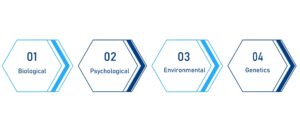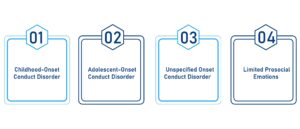Some children you know might be very quarrelsome, cruel to other kids, or violently aggressive toward them. This goes beyond simple rude behavior and may involve something called Conduct Disorder. Children who suffer from this kind of disorder tend to display a lack of behavioral control and disregard for rules and authority. Not seeking appropriate help can cause even bigger issues in the future. Hence, intervention by qualified personnel at an early stage is critical.
This article will focus on the different types and symptoms and how best to treat them. Parents, teachers, and caregivers can learn appropriate measures to help children control their behavior by taking in this condition, and this is so important. Keep reading to find out more!
What Is Conduct Disorder?
Conduct disorder (CD) is a problem with only two or three out of every hundred children. CD can set in at any age, but it is much more common in boys. It can be diagnosed when a child shows the following behaviors:
- Causes deliberate harm to animals or other human beings.
- Abuses and destroys property that belongs to someone else.
- Defies authority figures.
- Commits violent acts, which leads to social problems.
A child who regularly exhibits this behavior or shows a high level of dysfunction CD. For ADHD testing and other issues, you may contact us at MAVA Behavioral Health!
Conduct Disorder Symptoms
Below are the symptoms of conduct disorder.
- Transporting humans or animals with intent to cause severe injury or suffering.
- Acting in a manner that suggests the correct answer will bring personal benefit to the person.
- Unlawfully entering a building or a ship, or the illegal entry into vehicles, etc.
- Given in the arms in a school employ for class absences.
- Escaping from the house and staying awake at night.
- Disregarding rules and restrictions set by schools, families, or society.
Causes Of Conduct Disorder

1. Biological
Some studies have pointed towards specific area defects or injuries in the brain as the root cause of behavioral disorders. Certain brain regions responsible for impulse control, emotions, and behavioral regulation are strongly linked to it. Its symptoms could develop as a result of abnormal functioning of nerve cell circuits within these regions of the brain.
2. Psychological
Some experts say that disorders can arise from moral responsibility issues, particularly low levels of guilt combined with cognitive processing deficits.
3. Environmental
All these factors combine in a family history, which explains how they might contribute to the family background of a child suffering from discipline.
4. Genetics
Youths with such disorders tend to have families with mood disorders, anxiety disorders, substance use disorders, and personality disorders. This suggests that the etiology of it has some heritable component.
Conduct Disorder Examples
Here are some of the examples:
- Assaulting, physically torturing, menacing other individuals, and being savage toward animals.
- Deceiving others, robbery, and trespassing into homes, vehicles, and shops.
- Cutting classes, absconding, and partaking in deviant acts such as property defacement.
- Committing arson, smashing items, or other forms of vandalism.
- Exploiting people for self-interest without feeling any guilt for the immoral deeds done.
- At a young age, try out and even regularly consume alcohol, drugs, and other substances.
Types Of Conduct Disorders

1. Childhood-Onset Conduct Disorder
Symptoms start before age 10. These kids often show severe aggression or rule-breaking early. They are more likely to have long-term behavioral issues and a higher risk of developing antisocial personality disorder as adults. Early intervention is crucial for better outcomes.
2. Adolescent-Onset Conduct Disorder
Symptoms first appear during the teenage years. These teens are less likely to show severe aggression to childhood onset and are often influenced by peers or social environments. They tend to have better long-term outcomes but still require support to prevent ongoing issues.
3. Unspecified Onset Conduct Disorder
This is diagnosed when the exact age of symptom onset is unknown. When there’s not enough information about when behaviors started. The disorder still involves serious rule-breaking or aggressive behaviors, and treatment focuses on managing current symptoms while professionals work to understand the root causes.
4. Limited Prosocial Emotions
This subtype involves callous and unemotional traits, such as a lack of empathy, guilt, or remorse. These children are often manipulative or deceitful and may use charm to get what they want. This subtype includes severe and persistent behavioral problems.
Conduct Disorder in Adults
Most adults with Conduct Disorder (CD) were previously diagnosed with it in their youth or teenage years. This behavior disorder CD becomes an issue of concern for negative social behaviors such as hostility, lying, stealing, harming other individuals, or breaking social rules.
These individuals might find it hard to develop and maintain proper relationships, professional employment, and even obey laws. Most people who suffer from such disorder of childhood onset usually have behavioral problems in childhood that are poorly managed.
In addition, doctors may offer peripheral solutions to treat mood disorders, depression, and anxiety. Conduct disorder treatment involves ensuring that a proactive multidisciplinary approach focuses on rehabilitative treatment for conduct disorder as well as culture restoration. To achieve sustainable results, one must tackle issues of trauma, family problems, and substance use.
Conduct Disorder Vs ODD
Conduct Disorder | ODD |
| A severe behavioral disorder characterized by aggressive, violent, and rule-breaking behaviors. | A childhood disorder is a defiant, disobedient, and hostile behavior towards authority figures. |
| Diagnosis in late childhood or adolescence. | Diagnosis in early childhood (before age 8). |
| Aggression toward people/animals, destruction of property, deceitfulness, serious rule violations. | Argumentative, defiant, refuses to comply, easily annoyed, and deliberately annoying others. |
| More severe and persistent, it can lead to antisocial personality disorder in adulthood. | Milder than CD; does not involve severe aggression or law-breaking behavior. |
| Disregards rules and laws, violates others’ rights, and shows a lack of empathy. | Frequently argues with adults, refuses to comply, blames others for mistakes. |
How To Discipline a Child with Conduct Disorder?
PMT helps by giving parents to respond effectively to difficult behaviors. Having teachers, therapists, and family members work together is also helpful because it constantly encourages the child to do the right thing.
The utilization of discipline can be a challenge when dealing with children with such disorders possessing callous-unemotional traits. The indifference to consequences such as offending someone, losing friends, getting into trouble, or even behaving in a socially acceptable manner enables them to avoid punishment.
This will not work. Along with aggressive behavior, children respond better to supportive communication. Along with discipline, requesting the help of professionals is crucial.
Conduct Disorder Treatment
1. Medication
Medications can treat persistent functions such as impulsivity and aggression or co-morbid conditions like ADHD. Antidepressants could work to improve mood symptoms and stimulants for ADHD. Antipsychotics can be effective in treating severe aggression or irritability. As for impulsivity, mood stabilizers might work for those conditions. These other medicines would work best with therapy. It may be best to combine those conduct disorder treatment.
2. Lifestyle Changes
Adopting specific routines that systematically dictate rules can provide structure and order which minimizes behavioral disorder. Children determine and define boundaries within a healthy, supportive context that encourages good behavior and restrains adverse ones. Exercising regularly can improve mood, relieve stress, and help better manage symptoms.
Establishing positive and effective social support can help children receive positive reinforcement for controlling emotions. Avoiding substance use is extremely important to circumvent further behavioral issues.
Important Note:
All the details provided in this article aim for informational and educational purposes. Please don’t consider it medical advice or a substitute for a psychiatric evaluation. For professional guidance and treatment, consult with our licensed healthcare professionals at MAVA Behavioral Health.
To Sum Up
Conduct Disorder, in health terms, is a disorder that is serious in terms of behavioral conditions and is common in children and teens. The understanding of this disorder is critical since early conduct disorder treatment can avert severe consequences such as substance abuse, offending behavior, and issues with forming bonds. Parents and childcare providers must become familiar with the symptoms so that they can take the child for assistance to modify their behavior.
With the appropriate intervention, such as therapy and support, children with CD can learn self-regulation and socialize more constructively. Addressing this issue in a timely manner ensures greater prospects for the child and benefits society as a whole. So, reach out to us at MAVA Behavioral Health to get treatment for the mental health issues you have and dealing with for so long.
FAQs
How to treat conduct disorder?
At MAVA Behavioral Health, treatment includes medication management and comprehensive psychiatric evaluation to address underlying mental health conditions. Early intervention can help improve long-term outcomes for children.
Does conduct disorder go away?
Conduct Disorder can improve with early intervention, therapy, and proper treatment, but without help, it may persist into adulthood. Consistent support from mental health professionals, family, and educators plays a crucial role in managing symptoms.
How do you discipline a child with conduct disorder?
Consistent rules, positive reinforcement and structured consequences will encourage good behavior. Focus on a therapy-based strategy instead of harsh punishments to help children develop better-coping abilities.
What is the first-line treatment for conduct disorder?
Medication may be used if there are coexisting conditions like ADHD or depression. MAVA Behavioral Health offers psychiatric evaluations and medication management to support effective treatment.









